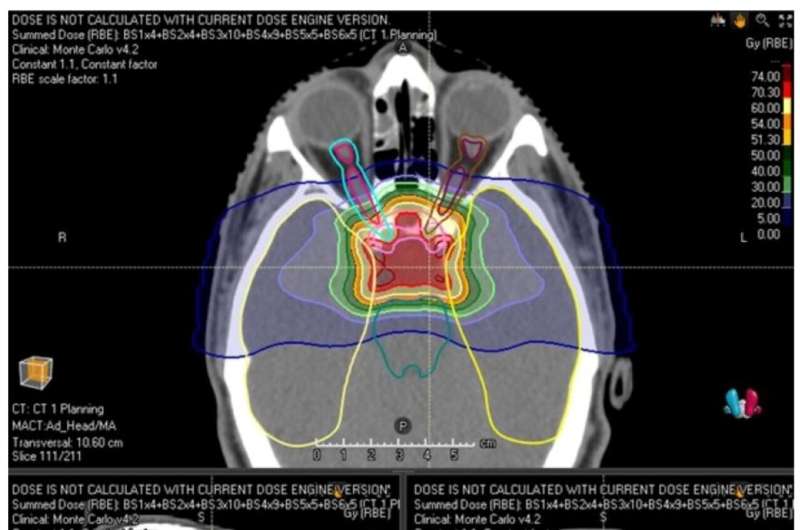This article has been reviewed according to Science X's editorial process and policies. Editors have highlighted the following attributes while ensuring the content's credibility:
fact-checked
proofread
Ion therapy safe and efficacious for the treatment of skull base cancer: Study

The MedAustron Center for Ion Therapy has demonstrated the safety and efficacy of both, proton and carbon ion therapy for the treatment of skull based chordomas, a bone located cancer. In a recent publication in Cancers, the institution presented conclusive data from the treatment of 44 patients with this rare cancer.
All patients were treated at MedAustron between August 2017 and October 2021 and received either proton or carbon ion therapy. The study shows that tumors with a volume below 49 cc could be extremely well controlled. The results underline the effectiveness of ion therapy and stress the importance of maximal debulking of larger tumors prior to particle therapy.
Particle therapy is state-of-the-art for cancer treatment. It is based on charged particles such as protons or carbon ions that are targeted at tumors with high energy. One of its main advantages over radiotherapy (e.g., X-ray) is the fact that the particle beams can be stopped in a precise location of the tissue, thereby reducing the exposure of healthy tissue. However, generating particle beams requires a particle accelerator.
A fact that limits the number of particle beam facilities throughout the world to approx. 100 in around 20 countries. MedAustron in Wiener Neustadt/Austria is one of such sites. Now scientists here published a first analysis of a mono-institutional experience of treating a cancer that is highly resistant to radiotherapy, the skull base chordoma (a rare cancer located in bones).
Efficacious and safe
The analysis is based on 44 patients that received particle therapy at MedAustron between 2017 and 2021 and took part in a follow-up assessment of up to 55 months.
Summarizing the results, Dr. Slavisa Tubin, Director of Clinical Radiobiology and Co-Scientific Director at MedAustron, comments, "Overall particle treatment achieved a local control of tumor growth of 95,5 % after two years and 90,9 % after three years. The progression-free survival rates in the same time intervals were also all above 90%. This is an excellent result for a therapy targeting a cancer type that is known to be resistant to radiotherapy."
At the same time the MedAustron team recorded no severe toxic side effects (grade 3) of the treatment, confirming its safety.
Patients were treated with either proton (89%) or carbon ions (11%), with carbon ions available from July 2019 onwards (2.5 years after protons were available).
Thereafter an algorithm developed at MedAustron aided the decision for the best possible treatment choice. Prof. Eugen Hug, Medical Director at MedAustron comments, "Our algorithm is based on a combination of the size of macroscopical residual disease and the proximity to or compression of critical structures. In general, carbon ions were the preferred choice for patients with poorer prognostic features."
Volume matters
Tumor volume was a particular strong parameter for this assessment: Volumes under 25 cc were treated with protons and those larger than 50 cc received carbon ions. Tumors with volumes falling in between were evaluated based on clinical judgment. No significant difference in outcome or side effects was observed for proton versus carbon ion therapy. But the study showed that tumor volumes below 49 cc could be controlled to 100% and that tumor volume in general was highly predictable of the treatment's outcome (p <0,01).
Prof. Piero Fossati, co-author and head of the Division of Radiation Oncology at Karl Landsteiner University of Health Sciences (KL) in Krems on this finding, "The importance of tumor volume at the time of particle treatment emphasizes the importance of upfront debulking of large lesions."
Overall, the results are in line with those of other groups and confirms the safety and efficacy of particle treatment for skull base chordoma. It also emphasis the focus of oncological research at MedAustron that aids the clinical use of highly advanced treatments for the benefit of patients.
More information: Slavisa Tubin et al, Proton or Carbon Ion Therapy for Skull Base Chordoma: Rationale and First Analysis of a Mono-Institutional Experience, Cancers (2023). DOI: 10.3390/cancers15072093



















